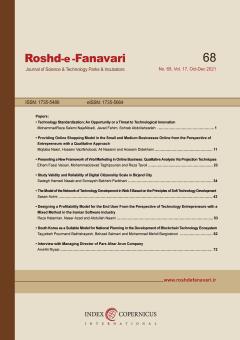Study Validity and Reliability of Digital Citizenship Scale in Birjand City
Subject Areas : مديريت تکنولوژيSadegh Hamedinasab 1 * , Someyyeh Bakhshiparikhani 2
1 -
2 -
Keywords: Validity, Reliability, Validity, Digital Citizen, Factor Analysis,
Abstract :
Due to the growing number of new media, the number of digital citizens in society is increasing day by day. A digital citizen is a citizen who has the ability to use the online services provided by the government of each country to the best of his ability. The purpose of this study was to investigate the validity and reliability of digital citizenship scale in Birjand city. The statistical population of this study was all individuals aged 18 years and older in Birjand city, of which 384 were selected by multi-stage cluster sampling. The instrument used in this research is a digital citizen questionnaire, Chui, Glassman and Kristol (2017). Content validity of the Persian version was verified according to the opinion of the experts. Factor structure of digital citizenship questionnaire was investigated using both exploratory factor analysis and confirmatory factor analysis. The exploratory factor analysis showed that 4 substances have high yields in more than one factor; these materials were eliminated, and finally the final model included four factors; Internet political activity, technological skills, critical and local-global awareness. It came out with 22 substances. For reliability of this tool, Cronbach's alpha coefficient was used, which coefficient for its components was 0.79- 0.99. Given that the validity and reliability indicators of the Persian version of the Digital Citizen scale were all favorable, it can be used as a valid and reliable tool to identify digital citizens.
1. احمدی، سیروس؛ حیدری، آرمان؛ زارعی، محبوبه. (1395). هدف تحلیل جامعهشناختی رابطه اعتماد اجتماعی و شهروند الکترونیک در شهر یاسوج. مطالعات جامعهشناختی شهری، 6(20)، 49-68.
2. استاندارد مهارت و آموزشی شهروند الکترونیک. (1388). گروه برنامه درسی فناوری اطلاعات سازمان آموزش فنی و حرفه¬ای کشور و وزارت کار و امور اجتماعی.
3. اکبری، محسن (1381). بررسی علل بی¬رغبتی خرید از فروشگاه الکترونیک شهروند در سطح شهر تهران. پایان¬نامه کارشناسی ارشد رشته مدیریت بازرگانی گرایش بازاریابی بین¬المللی. دانشگاه تهران.
4. بابانسب، رسول؛ ضرابی، اصغر. (1394). تحلیلی بر شاخص های شهروند الکترونیکی از نظر شهروندان در شهر تبریز. مطالعات شهری، 4 (13)، 57- 70.
5. جلالی، علی¬اکبر. (1384). شهروند الکترونیک. تهران: انتشارات دانشگاه علم و صنعت.
6. سرافرازی، مهرزاد و معمار زاده، غلامرضا. (1386). پارادایم دولت الکترونیک ضرورتی اساسی در استقرار شهرداری الکترونیک. چهارمین کنفرانس بین¬المللی مدیریت فناوری اطلاعات و ارتباطات. سالن هتل بین¬المللی المپیک. تهران.
7. شاه¬طلبی، بدری، قلی زاده، رحیم و شریفی، سعید (1389). مؤلفه¬های آموزش فرهنگ شهروندی برای دانش¬آموزان دوره راهنمایی تحصیلی با تأکید بر حیطه آموزه¬های دینی و شهروند الکترونیک. فصلنامه علوم تربیتی، 10، 178- 157.
8. شکرریز، محمدرضا. (1390). شهروند الکترونیک (کتاب درسی شاخه کاردانش). تهران: پیام کوثر.
9. کاستلز، مانوئل. (1393). قدرت ارتباطات. ترجمه حسین بصیریان جهرمی، تهران: پژوهشگاه فرهنگ، هنر و ارتباطات.
10. گریسون، دی. آر؛ و آندرسون، تری. (2003). یادگیری الکترونیکی در قرن 21 (مبانی نظری و عملی). ترجمه اسماعیل زارعی زوارکی و سعید صفایی موحد 1384. تهران: انتشارات علوم و فنون.
11. گودرزی، فریده (1385). بررسی تأثیر دوره آموزش ضمن خدمت فناوری اطلاعات و ارتباطات ICT در مهارت¬های شغلی از دیدگاه معلمان مقطع متوسطه استان لرستان. پایان¬نامه کارشناسی ارشد. دانشگاه علامه طباطبایی.
12. محمد جانی، ابراهیم؛ زارعیزوارکی، اسماعیل؛ مفیدی، فرخنده. (1392). بررسی جایگاه شهروند الکترونیک در کتاب کار و فناوری پایه ششم ابتدایی. فناوری اطلاعات و ارتباطات در علوم تربیتی، 3(3)، 71-88.
13. هو، رابرت. (1943). راهنمای تجزیهوتحلیل داده¬های تک متغیره و چندمتغیره و تفسیر آن¬ها با SPSS. ترجمه علی عسگری، 1392، شیراز: کوشا مهر.
14. Arif, R. (2016). Internet as a hope or a hoax for emerging democracies: revisiting the concept of citizenship in the digital age. Procedia - Social and Behavioral Sciences, 236. 4 – 8.
15. Bennett, W. Lance. (2008). Changing Citizenship in the Digital Age. MA: The MIT Press,. 1–24. doi: 10.1162/dmal.9780262524827.001.
16. Choi M., Glassman M. & Cristol D., (2017). What it means to be a citizen in the internet age: Development of a reliable and valid digital citizenship scale, Computers & Education, doi: 10.1016/j.compedu.2017.01.002.
17. Curran, M. B., & Ribble, M. (2017). P–20 Model of Digital Citizenship. New Directions for Student Leadership, 2017(153), 35-46.
18. D'Haenens, L., Koeman, J., & Saeys, F. (2007). Digital citizenship among ethnic minority youths in the Netherlands and Flanders. New Media & Society, 9(2), 278-299.
19. Eizediyazdanabadi, A., & Mirzaei, M. (2010). Infrastructure and requirements for electronic citizenship education in
secondary schools in Tehran. Review Quarterly Journal of Journal of Humanities of Imam Hossein University, 18(80),107-132. (in Persian).
20. Herrera, L. (2012). Youth and citizenship in the digital age: A view from Egypt. Harvard Educational Review, 82(3), 333-352.
21. Hollandsworth, R., Dowdy, L., & Donovan, J. (2011). Digital citizenship in K-12: It takes a village. TechTrends, 55(4), 37-47.
22. Isman, A., & Canan Gungoren, O. (2014). Digital Citizenship. Turkish Online Journal of Educational Technology, 13(1), 73-77.
23. Jeffrey, W. S, & Jongpil, Ch. (2009). Using E- Government to Reinforce Government Citizen Relationships Comparing Government reform in the United states and China. Journal of Social Science Computer Review, 27/ 1, 3- 23.
24. Jones, L. M., & Mitchell, K. J. (2015). Defining and measuring youth digital citizenship. New Media & Society, 17 (5), 1-17.
25. Juan- Gabriel, C. N., Jose, R. C. O, & Jose, L. M. C. (2012). E-government and citizens engage,ent with Local affairs through e- websites: The case of Spanish municipalities. International Journal of Information Management, 32, 469- 478.
26. Moonsun,. C. (2016). A concept analysis of digital citizenship for democratic citizenship education in the internet age. Theory & Research in Social Education, 44(4), 565-607.
27. Sullivan, C. (2016). Digital citizenship and the right to digital identity under international law. Law center, georgetown university,washington, dc, usa. Computer law & security review 32 .474–481.

